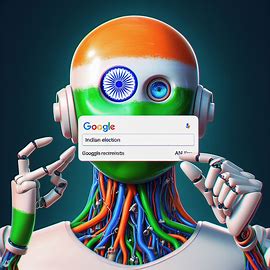Artificial intelligence (AI) is transforming the world of natural language processing (NLP), the branch of computer science that deals with understanding and generating human languages. One of the most impressive and influential examples of NLP is ChatGPT, a large-scale AI model developed by OpenAI, a research organization based in San Francisco. ChatGPT can generate coherent and diverse texts on almost any topic, given a prompt or a context. ChatGPT can also engage in natural and fluent conversations with humans, as well as perform various tasks such as summarizing, translating, and answering questions. BharatGPT: India’s multilingual AI model
However, ChatGPT has a limitation: it is mainly trained on English texts, and thus it is not very good at handling other languages, especially those that have different scripts, grammars, and vocabularies. This is a problem for many countries and regions that have rich and diverse linguistic cultures, such as India.
India is home to 22 official languages, and hundreds of other languages and dialects. These languages are not only a source of identity and heritage, but also a medium of communication and education for millions of people. Therefore, there is a need for AI models that can understand and generate texts in Indian languages, and enable natural language applications and services for Indian users. Artificial intelligence (AI) is transforming the world of natural language processing (NLP), the branch of computer science that deals with understanding and generating human languages. One of the most impressive and influential examples of NLP is ChatGPT, a large-scale AI model developed by OpenAI, a research organization based in San Francisco. ChatGPT can generate coherent and diverse texts on almost any topic, given a prompt or a context. ChatGPT can also engage in natural and fluent conversations with humans, as well as perform various tasks such as summarizing, translating, and answering questions. BharatGPT: India’s multilingual AI model
This is where BharatGPT comes in. BharatGPT is a project to develop a large-scale AI model for Indian languages, similar to ChatGPT, but with a focus on the linguistic diversity and complexity of India. BharatGPT is a joint initiative by Reliance Jio, India’s largest telecom company, and IIT-Bombay, one of India’s premier engineering institutes. The project was announced in January 2024, and aims to create a multilingual AI model that can handle 22 official languages of India, as well as some regional and minority languages.
BharatGPT will use a massive amount of data from various sources, such as books, newspapers, websites, social media, and speech, to train its AI model. The model will use a deep neural network architecture, similar to ChatGPT, but with some modifications and adaptations to suit the specific characteristics and challenges of Indian languages. For example, BharatGPT will use a subword tokenization technique, which splits words into smaller units, to deal with the large and diverse vocabularies of Indian languages. BharatGPT will also use a multilingual embedding layer, which maps words from different languages into a common vector space, to enable cross-lingual transfer and learning. Artificial intelligence (AI) is transforming the world of natural language processing (NLP), the branch of computer science that deals with understanding and generating human languages. One of the most impressive and influential examples of NLP is ChatGPT, a large-scale AI model developed by OpenAI, a research organization based in San Francisco. ChatGPT can generate coherent and diverse texts on almost any topic, given a prompt or a context. ChatGPT can also engage in natural and fluent conversations with humans, as well as perform various tasks such as summarizing, translating, and answering questions. BharatGPT: India’s multilingual AI model
BharatGPT’s main goal is to enable natural language understanding and generation for Indian languages, and to support various natural language applications and services, such as chatbots, assistants, tutors, and translators. BharatGPT will also aim to foster research and innovation in the field of NLP for Indian languages, and to create a platform for collaboration and exchange among researchers, developers, and users.
BharatGPT is India’s answer to OpenAI’s ChatGPT, and a testament to India’s ambition and potential in the domain of AI and NLP. BharatGPT is expected to be completed and released by the end of 2024, and will be available for public and private use. BharatGPT will not only benefit India, but also the global community of AI and NLP enthusiasts and practitioners, who will have access to a new and powerful resource for natural language processing.


Hi there i am kavin, its my first time to commenting anyplace, when i
read this piece of writing i thought i could also make comment due to this brilliant paragraph.
my homepage; vpn special coupon code 2024
An impressive share! I have just forwarded this onto a friend
who has been conducting a little homework on this. And he actually ordered me lunch due to the fact that
I discovered it for him… lol. So let me reword this….
Thanks for the meal!! But yeah, thanks for spending the time to talk about this subject here on your internet site.
my blog post; vpn special coupon code 2024
Way cool! Some very valid points! I appreciate you penning this post plus
the rest of the website is really good.
Also visit my homepage facebook vs eharmony to find love online
We’re a group of volunteers and starting a new scheme in our
community. Your web site provided us with valuable info to
work on. You’ve performed an impressive task and
our whole neighborhood can be grateful to you.
Here is my page; nordvpn special coupon code 2024